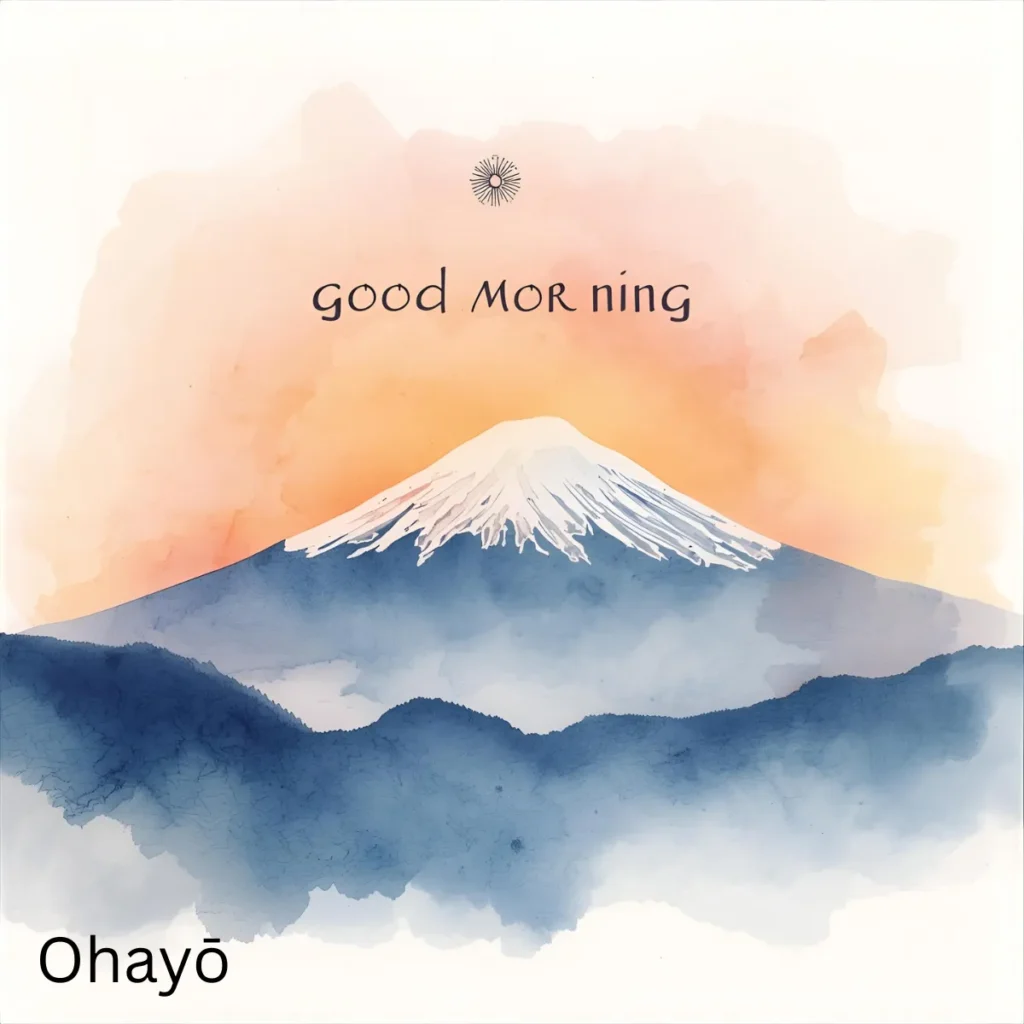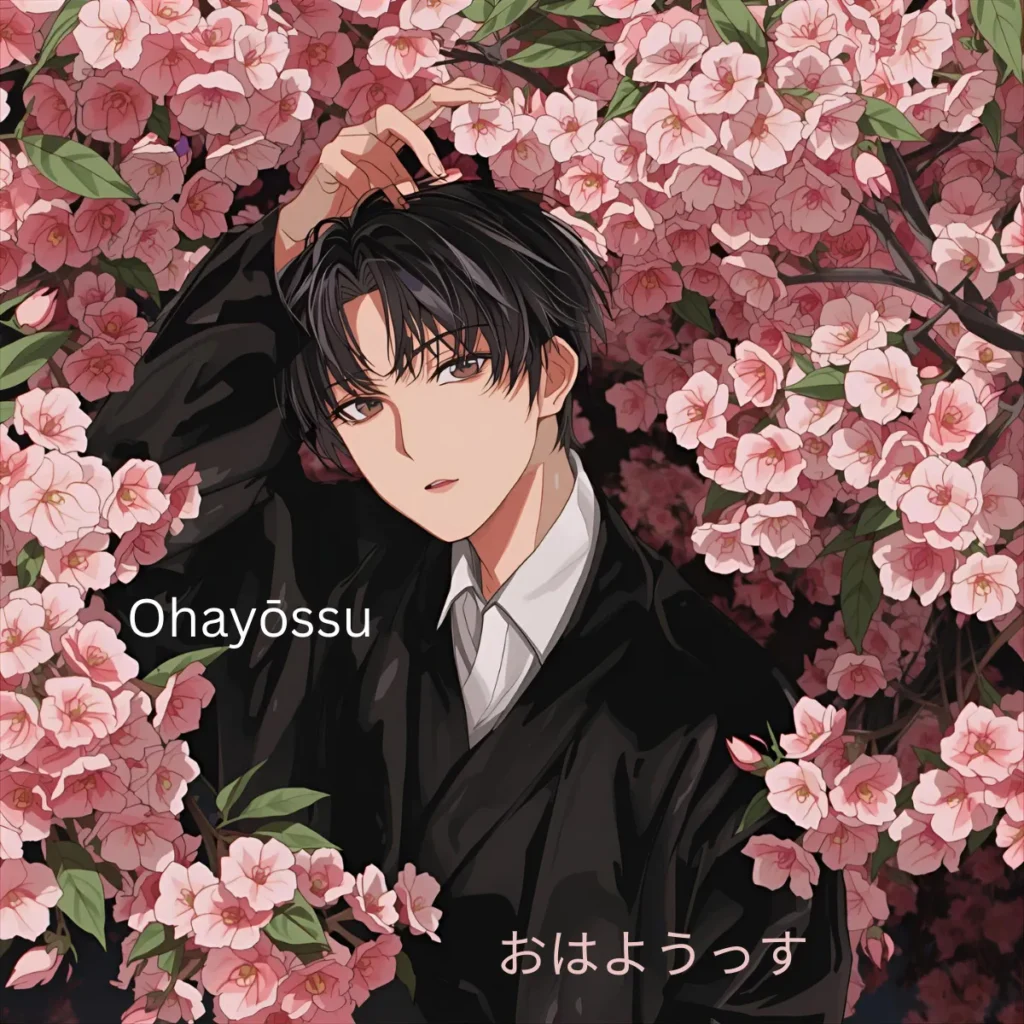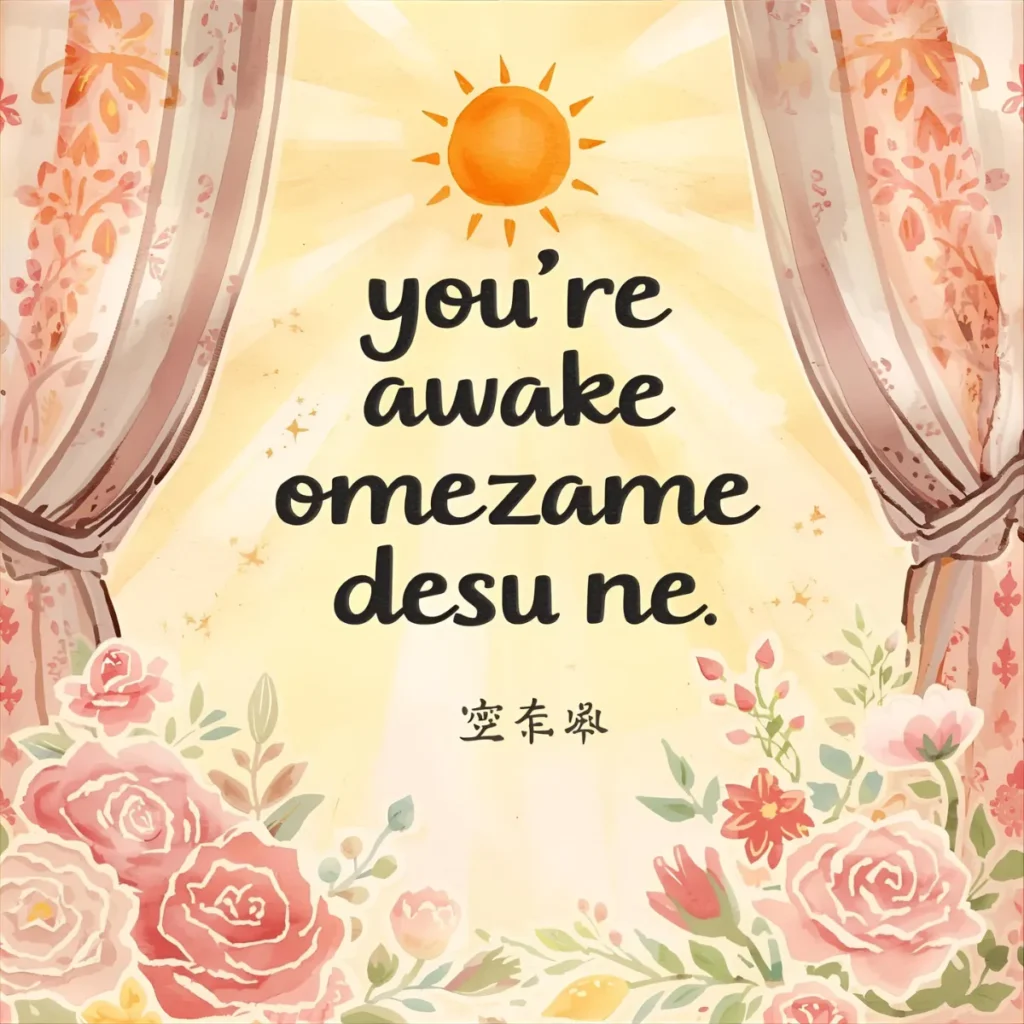Good morning in Japanese is most commonly said as “Ohayō” (おはよう) in casual situations and “Ohayō gozaimasu” (おはようございます) in polite or formal settings. Both phrases are widely used in daily life, at home, school, and work.
People usually search how to say good morning in Japanese when learning basic Japanese, traveling to Japan, or greeting Japanese friends and coworkers. The main intent is to learn the correct phrase, understand when to use polite vs casual, and sound natural without confusion.
Using “Ohayō” with friends and family feels friendly, while “Ohayō gozaimasu” shows respect in professional or public situations. These greetings are easy to remember, beginner-friendly, and help start conversations politely in Japanese culture.
Say Good Morning in Japanese
Let’s explore 15 ways to say good morning in Japanese, with dialogues and origins behind each phrase.
15 Ways to Say Good Morning in Japanese
| # | Japanese Phrase | Romaji | English Meaning |
|---|---|---|---|
| 1 | おはよう | Ohayou | Good morning (casual) |
| 2 | おはようございます | Ohayou gozaimasu | Good morning (formal/polite) |
| 3 | おはよ | Ohayo | Morning! (very casual/shortened) |
| 4 | 今日もおはよう | Kyou mo ohayou | Good morning again today |
| 5 | 朝だよ | Asa da yo | It’s morning! |
| 6 | おはよう、元気? | Ohayou, genki? | Good morning, how are you? |
| 7 | おはよう、みんな | Ohayou, minna | Good morning, everyone |
| 8 | おはようございます、先生 | Ohayou gozaimasu, sensei | Good morning, teacher |
| 9 | おはよう、愛してる | Ohayou, aishiteru | Good morning, I love you |
| 10 | おはよう、友達 | Ohayou, tomodachi | Good morning, my friend |
| 11 | おはよう、ハニー | Ohayou, hanii | Good morning, honey (romantic) |
| 12 | 良い朝ですね | Yoi asa desu ne | It’s a nice morning, isn’t it? |
| 13 | おはよう、かわいいね | Ohayou, kawaii ne | Good morning, you look cute |
| 14 | 今日も頑張ろう | Kyou mo ganbarou | Let’s do our best today (morning encouragement) |
| 15 | おはよう、よく眠れた? | Ohayou, yoku nemureta? | Good morning, did you sleep well? |
1. おはよう (Ohayō)

Origin
Derived from the longer phrase “おはようございます,” this is the casual way to say good morning to friends or people your age.
Example:
👤 User A: おはよう!(Ohayō!)
👤 User B: おはよう、元気? (Ohayō, genki?)
(Good morning! / Morning, how are you?)
Use: Casual; for friends, family, classmates.
2. おはようございます (Ohayō gozaimasu)
Origin:
This is the polite and standard form of “good morning” in Japanese. The “ございます” adds respect and politeness.
Example:
👤 User A: おはようございます、田中さん。(Ohayō gozaimasu, Tanaka-san.)
👤 User B: おはようございます。(Ohayō gozaimasu.)
Use: Formal settings like the workplace, elders, or strangers.
3. おはようっす (Ohayōssu)

Origin:
A slangy, masculine twist on “ohayō”, often used by teenage boys or athletes. It has a rough, laid-back feel.
Example:
👤 User A: おはようっす!今日の練習どう? (Ohayōssu! Kyō no renshū dō?)
👤 User B: 頑張るよ!(Ganbaru yo!)
(Morning! How’s today’s practice? / I’ll give it my all!)
Use: Informal male speech, youth culture, sports clubs.
4. 朝っす (Asassu)
Origin:
A super casual shortening of “asa desu” (It’s morning), used in slang or joking contexts.
Example:
👤 User A: 朝っす!(Asassu!)
👤 User B: 朝からテンション高いね!(Asa kara tenshon takai ne!)
(Morning! / You’re hyped up early today!)
Use: Street slang, humorous or exaggerated tone.
5. よっ!朝だね (Yo! Asa da ne)
Origin:
“Yo!” is like saying “Hey!” and “Asa da ne” means “It’s morning, huh?” Very casual and playful.
Example:
👤 User A: よっ!朝だね!(Yo! Asa da ne!)
👤 User B: ホントだ〜眠い。(Honto da~ nemui.)
(Yo! Morning, huh? / Yeah, still sleepy.)
Use: Extremely casual; used among close friends.
6. おはようござんす (Ohayō gozansu)

Origin:
An older, Edo-period dialectal version of “ohayō gozaimasu.” Still heard in period dramas or stylized speech.
Example:
👤 User A: おはようござんす、ご隠居。(Ohayō gozansu, goinkyo.)
👤 User B: おう、おはよう。(Ō, ohayō.)
(Morning, master. / Morning.)
Use: Historical or dramatic effect; not for modern daily use.
7. 朝おっす!(Asa ossu!)
Origin:
“Ossu” is a masculine greeting with roots in martial arts culture. Combined with “asa” (morning), it becomes a powerful, energetic “Morning!”
Example:
👤 User A: 朝おっす!(Asa ossu!)
👤 User B: おっす!今日もやるぞ!(Ossu! Kyō mo yaruzo!)
(Morning! / Yeah! Let’s crush it today!)
Use: Male speech, martial arts, tough-guy tone.
8. 朝、おはー!(Asa, oha–!)
Origin:
“Oha–” is a shortened, pop-culture version of “ohayō”, made popular by TV idols and anime characters in the 1990s.
Example:
👤 User A: 朝、おはー!(Asa, oha–!)
👤 User B: おはー!元気?(Oha–! Genki?)
(Morning! / Morning! Doing okay?)
Use: Cute, childish, anime-inspired.
9. モーニン!(Mōnin!)
Origin:
A katakana borrowing of the English “Morning!”, used mostly for fun, stylization, or casual texting.
Example:
👤 User A: モーニン!今日も頑張ろう!(Mōnin! Kyō mo ganbarō!)
👤 User B: おー!(Ō!)
(Morning! Let’s do our best today! / Yeah!)
Use: Very informal; text messages or pop speech.
10. おは〜ん (Oha~n)
Origin:
A cutesy, sometimes flirty take on “ohayō”, often used by women in anime or idol culture.
Example:
👤 User A: おは〜ん♡(Ohan)
👤 User B: 朝からテンション高いな〜(Asa kara tenshon takai na~)
(Mooorning~! / You’re so peppy this morning~)
Use: Cute, exaggerated, joking.
11. 早安 (Zǎo ān – Chinese)
Origin:
While not Japanese, this Chinese greeting sometimes pops up in Japanese pop culture, especially with bilinguals or in manga that play with language.
Example:
👤 User A: 早安!(Zǎo ān!)
👤 User B: 何それ?中国語?(Nani sore? Chūgokugo?)
(Morning! / What’s that? Chinese?)
Use: Bilingual jokes, cross-language learners.
12. おっはー!(Ossha–!)
Origin:
This comical greeting was coined by Japanese comedian Tetsuya Yanagihara in the late 90s and became a hit catchphrase.
Example:
👤 User A: おっはー!(Ossha–!)
👤 User B: 懐かしい!(Natsukashii!)
(Ohha! / That’s nostalgic!)
Use: Retro, humorous reference to old TV.
13. 良い朝ですね (Yoi asa desu ne)
Origin:
Translates to “It’s a nice morning, isn’t it?”—a more poetic, natural Japanese way to greet someone.
Example:
👤 User A: 良い朝ですね。(Yoi asa desu ne.)
👤 User B: ええ、本当に気持ちいいです。(Ee, hontō ni kimochi ii desu.)
(Nice morning, huh? / Yes, it feels great.)
Use: Polite, natural, suitable for neighbors or coworkers.
14. お目覚めですね (Omezame desu ne)

Origin:
Polite and elegant, meaning “You’ve awakened,” often used in care settings, hotels, or poetic speech.
Example:
👤 User A: お目覚めですね、先生。(Omezame desu ne, sensei.)
👤 User B: はい、ありがとう。(Hai, arigatō.)
(You’re awake, sir. / Yes, thank you.)
Use: Formal, service-related, or gentle speech.
15. 朝から元気ですね!(Asa kara genki desu ne!)
Origin:
Not a greeting per se, but a common morning phrase meaning “You’re full of energy this morning!”
Example:
👤 User A: おはよう!(Ohayō!)
👤 User B: 朝から元気ですね!(Asa kara genki desu ne!)
(Morning! / You’re full of energy today!)
Use: Friendly observation, great for making conversation.
FAQs
- What is the common way to say good morning in Japanese?
The most common phrase is “Ohayō gozaimasu” (おはようございます). - How do you pronounce “Ohayō gozaimasu”?
It’s pronounced oh-ha-yoh go-zai-mah-s. - Is “Ohayō gozaimasu” formal or casual?
It’s polite and used in formal or respectful situations. - How do you say good morning to a friend?
You can say “Ohayō” (おはよう) — a casual version. - When can you use “Ohayō gozaimasu”?
It’s used in the morning, usually before 10 or 11 a.m. - Can I use “Ohayō gozaimasu” at work?
Yes, it’s perfect for workplaces or when greeting . - Is there a difference between “Ohayō” and “Ohayō gozaimasu”?
Yes — “Ohayō” is informal; “Ohayō gozaimasu” is polite. - How do you reply to “Ohayō gozaimasu”?
Simply say “Ohayō gozaimasu” back. - Can I use “Konnichiwa” instead of “Ohayō gozaimasu”?
Not in the morning — “Konnichiwa” means good afternoon. - Is “Good morning” used often in Japan?
Yes, it’s a common and polite greeting used daily.
Conclusion:
How to Say Good Morning in Japanese can be as simple as using “Ohayou” with friends or “Ohayou gozaimasu” in more formal situations. By learning both casual and polite variations, you’ll be able to greet Japanese speakers naturally and respectfully. This small but important phrase helps you create a positive impression and start conversations warmly.



